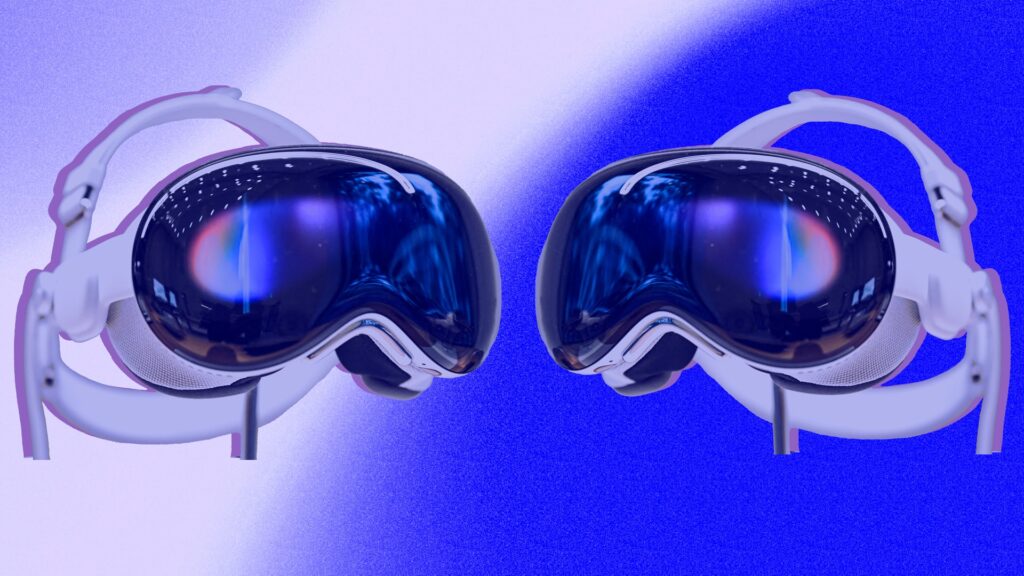Apple’s ambition to create augmented reality (AR) glasses that connect seamlessly to Macs has hit a significant roadblock. The project faced numerous technical challenges, leading to its abrupt cancellation. The decision reflects Apple’s ongoing difficulties in breaking into the everyday AR market. It’s a story of trial and error, even for a tech giant like Apple.
Earlier attempts at pairing the AR glasses with iPhones were foiled by battery issues, prompting a switch to Mac connectivity. The strategy didn’t solve the problem, however, and ultimately stalled the project. This move marks a rare retreat for Apple as it struggles to keep up with competitors in the AR field.
A Vision Unfulfilled
Apple’s foray into AR glasses, code-named N107, promised a blend of normal eyewear with digital displays. The glasses were designed to work with Macs, but technical hiccups doomed the venture. Apple couldn’t find an appealing price point, and performance issues only added to their woes.
Switching from iPhones to Macs was meant to leverage the latter’s superior battery and processors. Yet, even with these advantages, the glasses didn’t make the cut. Apple’s team struggled to balance functionality and cost, leaving the glasses a pipe dream.
The company’s hesitation to proceed with development came from internal dissatisfaction. Despite advanced prototypes, the glasses were deemed unready for market.
It’s a harsh revelation that not every Apple project turns to gold. Some ideas, even ambitious ones, may never see the light of day.
Competitors Forge Ahead
While Apple stalls, other tech companies are advancing their AR offerings. Meta, for instance, unveiled its Orion AR glasses last year, gaining traction.
AR glasses from Xreal and Lenovo offer further competition, showing Apple’s delay could cost them a slice of the market share.
Apple’s stutter-step highlights how fierce competition in the AR space has become.
As others move forward, Apple finds itself reassessing its strategy in this evolving market.
The Expensive Lesson
Apple’s Vision Pro headset, priced at $3,499, has also faced hurdles in gaining adoption. It showcases the challenge in balancing innovation with consumer accessibility.
Reports indicate Apple diverted resources from Vision Pro 2 to focus on a more affordable alternative.
High price tags can deter potential buyers, hinting at a need for more consumer-friendly pricing strategies.
The pricey lesson for Apple is clear: innovation is key, but so is affordability.
The Future of Apple’s AR Ambitions
Despite setbacks, Apple isn’t likely to abandon AR altogether. The company’s known for bouncing back stronger.
Insiders suggest new AR projects are already in the works, aimed at refining technology and cost.
Apple could leverage its Mac and iPhone ecosystems to create a holistic AR experience for users.
Though current efforts faltered, Apple’s vision might still redefine AR in future iterations.
What It Means for Consumers
The cancellation doesn’t mean consumers are left without options. Other brands offer comparable AR experiences.
Apple’s retreat may delay its AR ambitions, but it pushes them to innovate more meaningfully.
Customers can expect future products to better integrate AR functionalities.
Eventually, Apple’s endeavors might bring AR to mainstream consumers.
Tech Challenges Behind the Scene
Developing AR glasses is no small feat, given battery life and performance demands.
Apple’s engineers grappled with making AR practical for everyday use, a task easier said than done.
With technology constantly evolving, these challenges might eventually be overcome.
The tech hurdles highlight the complexity of creating seamless AR experiences.
Apple’s Strategic Reassessment
Apple’s decision might indicate a strategic pivot rather than an outright failure.
Reassessing goals helps keep projects aligned with market needs.
The reevaluation could lead to smarter investments in AR technology.
Apple’s ability to pivot embodies innovation.
Industry Reactions
The tech world is abuzz with Apple’s decision, sparking debates on its impact.
Some view it as a misstep, while others see it as a pragmatic choice.
Reactions highlight the high stakes involved in AR development.
No matter the viewpoint, Apple’s moves are always closely watched.
Apple’s decision to cancel its Mac-connected AR glasses project reflects the challenges of merging tech and practicality. Despite the setback, it could lead to smarter, more focused innovations in the future. The tech giant’s journey in AR is far from over, promising intriguing developments ahead.





